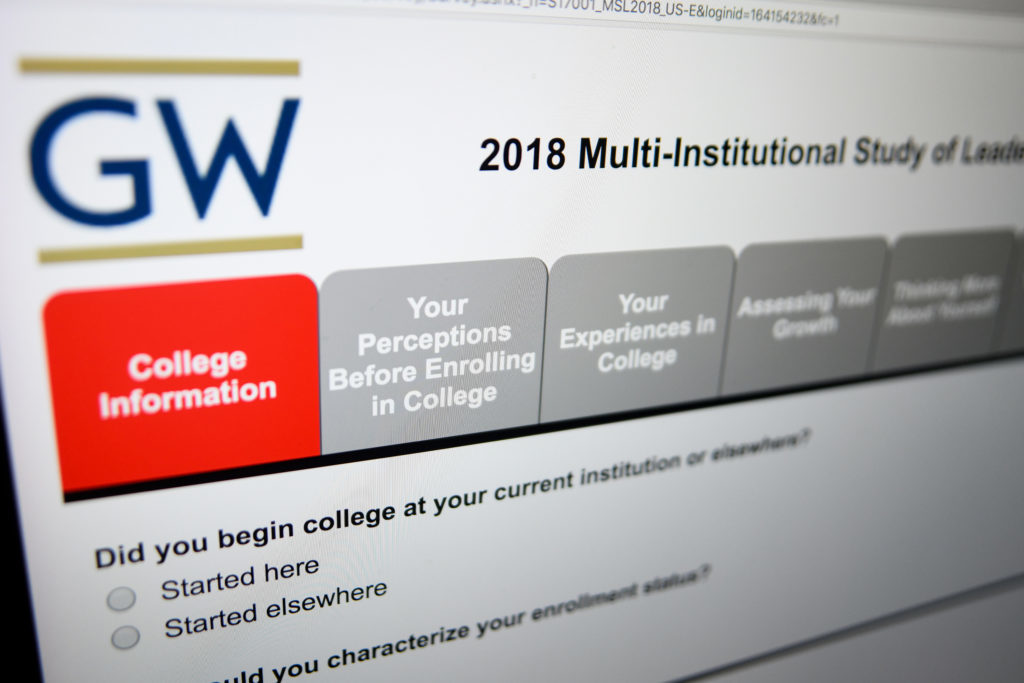Two national student surveys are helping GW scope out trends in the student body.
The Multi-Institutional Study of Leadership and Real College Survey were sent out last month to gauge student opinions about their experiences at GW, according to survey analysts. Researchers who conducted the studies said findings will help the University and higher education researchers better understand how students feel about major topics, like affordability and civic leadership, to help boost retention.
In the surveys, students answer questions about topics like what they thought college would be like before they attended, how they’ve grown since attending college and if they’ve thought about transferring institutions.
Jed Richardson, an associate professor at the University of Wisconsin, who conducted the Real College Survey, said GW asked for the survey to be sent out to gain insight into why students may not be successful in college. The questions spanned from how students pay for college to whether they seek assistance to pay for food or housing.
In recent years, officials have identified retention – the percentage of students who remain at GW – as a top University priority. In 2016, the University named the first director of retention to oversee the effort.
Last month, officials announced they would create a new office dedicated to enrollment and the student affairs, allowing a student’s experience from recruitment to graduation to be managed in one office.
This academic year, officials have frequently discussed improving students’ experiences on campus, focusing on issues like dining, housing, health and academics.
He said findings from the study, which was also sent out to about 70 other universities, will be released in two reports, one that averages findings across all researched campuses and one that is specific to each school.
“What we’re doing is helping George Washington get a better picture of their students’ lives and their challenges,” he said.
He said questionnaires tap into student concerns, like the cost of attendance, housing or textbook expenses that would otherwise be overlooked by universities because there are often inaccurate assumptions universities make about how much their students are paying to attend school.
“It’s learning things like that that help propel solutions to students’ actual problems and not the problems we think they have,” Richardson said.
He said the University is left to decide whether or not the findings will be made public. Universities will hopefully use the results to “better student outcomes” by instituting policies that will assist students and improve their wellbeing on campus, he added.
John Dugan, a microeconomist at the University of Loyola-Chicago, who is leading the study about leadership, said the survey is an examination of how universities aid students in becoming “socially responsible” leaders.
He said the Multi-Institutional Study of Leadership has been conducting the study for more than a decade in an effort to trace trends and determine strategies that will “catalyze the next generation of civic, political and scientific leaders our society so desperately needs.”
The Multi-Institutional Study of Leadership is gearing their study toward GW students for the first time this year, along with about 80 other universities.
“We were thrilled to partner with the school to conduct this study and learn from all the good work already being done,” Dugan said in an email.
The findings will be compared on both a local and national scale to pinpoint areas of growth and strategies to assist student development with the goal of improving society, he said. Group, societal and individual values are all key considerations that contribute to social change and encourage leadership, according to findings from the research.
“It provides a compass so that schools can identify pathways to enriching students experiences, learning and development,” Dugan said.
University spokeswoman Maralee Csellar said several surveys are distributed to students throughout the academic year to provide insights into students’ experiences in and out of the classroom.
“The surveys that originate from GW offices and departments are usually issued because the department/office is seeking information about the student’s experience in order to make improvements, learning about student opinions or attitudes or asking students to help them as part of a research project,” she said in an email.
She declined to say how many students receive the surveys, but they are usually sent out to subsets of a target population because “when students receive too many surveys, they stop completing them, resulting in findings that may not be accurate or represent the opinions of the targeted population.”
She said the surveys usually yield a response rate of about 25 to 30 percent.



